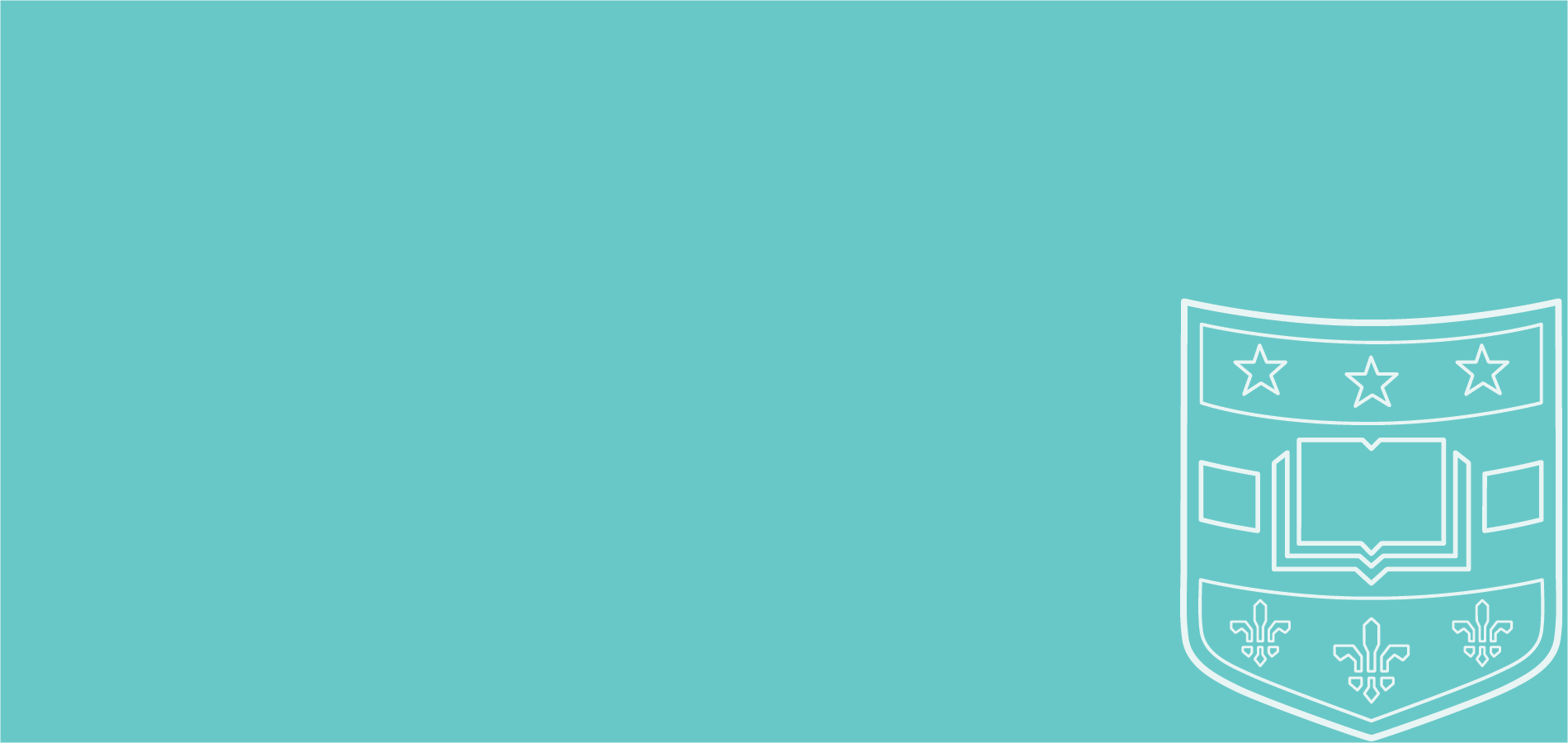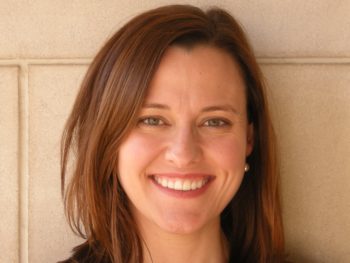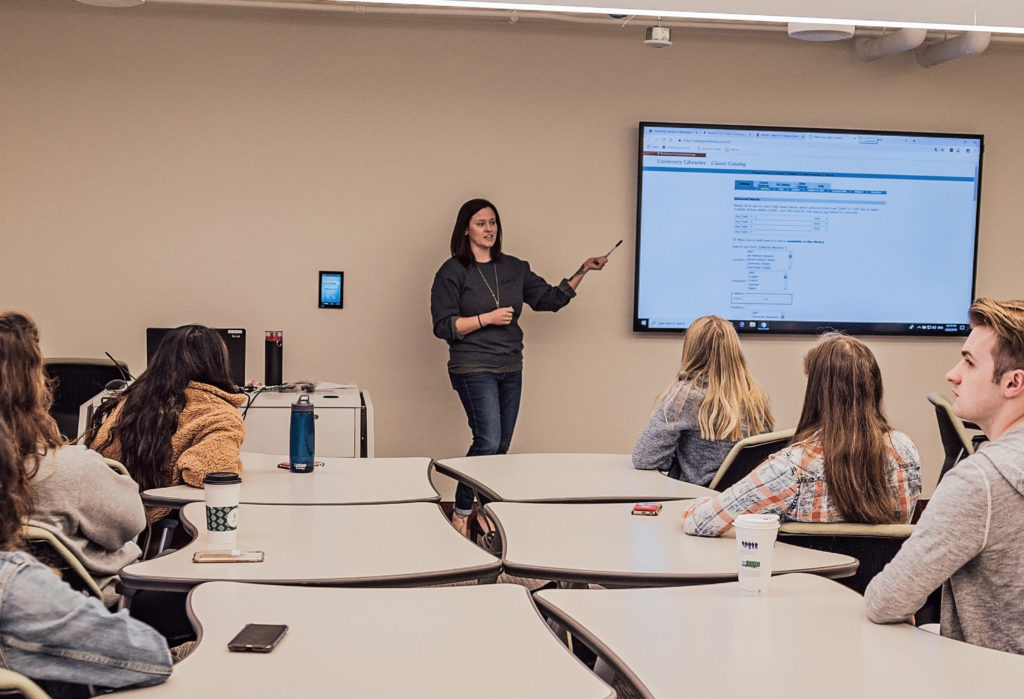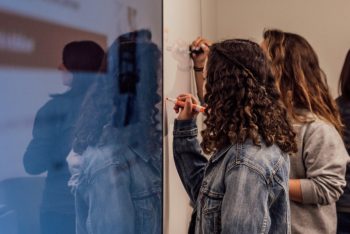
University Libraries’ Instruction and Information Literacy Program Helps Students Achieve Academic Excellence
A growing program at the Washington University Libraries is helping students make sense of today’s complex information climate.
Introduced in spring 2018, the Libraries’ Instruction and Information Literacy Program aims to turn rising scholars into savvy researchers with the skills to navigate the ever-evolving media landscape and think critically about the information they encounter. Through the program, at the request of faculty members, the Libraries provide class instruction sessions in information literacy, an area of pedagogy that has grown in importance over the past few decades thanks in part to the rise of digital media, which has made information of all kinds more accessible than ever before.
The Association of College and Research Libraries (ACRL) defines information literacy as “the set of skills needed to find, retrieve, analyze, and use information.” The Libraries’ program works to build student competencies in all of these areas.

“Information literacy is becoming more and more central to the success of students,” says Amanda Albert, who is Information Literacy Coordinator at the University Libraries and head of the instruction program. “Today you can find information on anything, but the evaluation factor is a challenge. Part of what we’re dealing with is how to tease out all of the voices that are out there and determine what’s legitimate.”
A faculty member who requests an instruction session can collaborate with Albert on desired learning outcomes and the creation of an assignment for the students—an activity that might involve a research component. A session can be tailored to meet the needs of a particular course. Albert might provide an introduction to library resources or an overview of how to arrange citations in a paper, or she might target a specific discipline. She will come to a faculty member’s classroom to teach or conduct the session in one of the three instruction rooms on Level A of John M. Olin Library, each of which is equipped with cutting-edge technology and provides flexible environments for group work and active learning.
John Furlong, associate university librarian for the Libraries’ Research and Academic Collaboration Services Division, sees the program as an opportunity for the Libraries to share resources. “We want to further embed the Libraries into the academic success of our students and assist our faculty and researchers with teaching and research tools,” he says. “I think the program can only help to further university-wide research, instructional support, and information discovery.”
Albert uses the ACRL’s Framework for Information Literacy for Higher Education as a foundation for her instruction sessions. Formally adopted by the ACRL in 2016 in response to the evolving world of academia and the challenging information landscape, the framework is made up of six central ideas and related practices that students should be able to implement as scholars. Those ideas include looking at information creation as a process, understanding issues regarding authority and credibility, and recognizing that information has value, like any other commodity.

Students gain an understanding of intellectual property and copyright laws under the framework, and they learn to approach the search for information as a targeted form of exploration—one that calls for adaptability and open-mindedness. They become empowered to act as participants in the information-making process, which now more than ever requires engagement, reflection, analysis, and critical thinking.
The ACRL framework provides a starting point for instructors like Albert, who says the search component is the one she teaches the most frequently.
“Students are surprised to learn how many resources we have at the Libraries,” she says. “They come from high school, and they may be familiar with a database like JSTOR, but when I pull up the list of around 950 databases that are available at the Libraries, they can feel overwhelmed. Knowing where and how to search for information, and knowing what steps to take to critically evaluate that information is very important.”
Albert describes her approach as hands-on. She starts by meeting with a faculty member, talking through what the students need to know, and getting a copy of the syllabus. She goes into each session with clear goals and strategies for determining if the class is meeting those goals. She works with each group of students at least twice and has had as many as seven sessions with a class. She teaches 30 to 40 sessions over the course of a semester.

Albert often works with classes from the College Writing Program. Rachel Adams, assistant director of the program, feels the guidance provided by the Libraries helps students adjust to academia while also preparing them for life beyond the university. Information literacy, she believes, is “important to their success as human beings in their future careers and out in the world. The university as an environment can be intimidating, and becoming a scholar is intimidating,” Adams notes, “but the library offers many levels of support to students.”
Faculty members who want to know more about the Instruction and Information Library Program should contact their subject librarians or reach out to Albert. Additional information on the program is available here.
